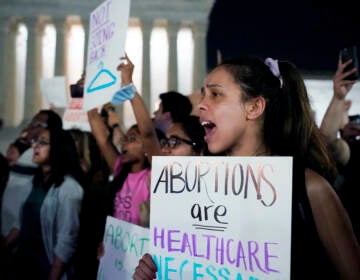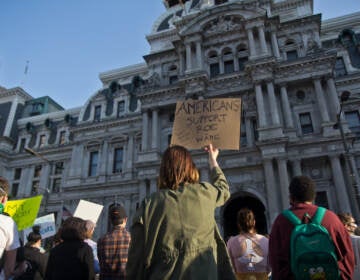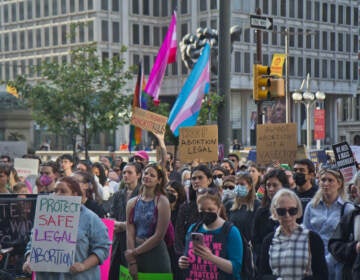With Roe dead, some fear rollback of LGBTQ and other rights
In a separate concurring opinion, Justice Clarence Thomas said the court should review other precedents, including its 2015 decision legalizing same-sex marriage.

A person walks past Planned Parenthood Friday, June 24, 2022, in St. Louis. (AP Photo/Jeff Roberson)
The U.S. Supreme Court’s decision allowing states to ban abortion immediately stirred alarm Friday among LGBTQ advocates, who feared that the ruling could someday allow a rollback of legal protections for gay relationships, including the right for same-sex couples to marry.
In the court’s majority opinion overturning the 1973 Roe v. Wade decision, Justice Samuel Alito said the decision applied only to abortion. But critics of the court’s conservative majority discounted that statement.
And in a separate concurring opinion, Justice Clarence Thomas said the court should review other precedents, including its 2015 decision legalizing same-sex marriage, a 2003 decision striking down laws criminalizing gay sex and a 1965 decision declaring that married couples have a right to use contraception.
“Let’s just be clear. Today is about this horrifying invasion of privacy that this court is now allowing, and when we lose one right that we have relied on and enjoyed, other rights are at risk,” said Jim Obergefell, the plaintiff in the landmark ruling legalizing same-sex marriage, who is now running as a Democrat for the Ohio House.
Abortion opponents celebrated the potential for states to ban abortion after nearly 50 years of being prevented from doing so. Some also argued that the case did not have implications beyond that, noting Alito’s specific statement.
“And to ensure that our decision is not misunderstood or mischaracterized, we emphasize that our decision concerns the constitutional right to abortion and no other right,” Alito wrote. “Nothing in this opinion should be understood to cast doubt on precedents that do not concern abortion.”
Still, said Paul Dupont, a spokesman for the conservative anti-abortion American Principles Project, conservatives are optimistic about the potential for future victories on cultural issues, though getting more states to ban abortion is “a huge enough battle.”
“If there is a thought that this could apply elsewhere, you know, they’re not going to say it here, and we’re just going to have to see,” Dupont said.
Many abortion opponents insist that overturning Roe will not affect access to birth control or LGBTQ rights. Other factors could protect those rulings too: The Obergefell decision that legalized same-sex marriage was based on equal protection, and hundreds of thousands of couples have relied on it to wed, a precedent that many courts would be loath to disturb.
Still, a sharp increase in anti-LGBTQ rhetoric in the U.S. and opposition to some forms of birth control from some quarters on the right have advocates concerned that those rights are vulnerable.
The court’s three most liberal members argued that the majority decision “breaches a core rule-of-law principle, designed to promote constancy in the law” and “places in jeopardy” other rights.
At the White House, President Joe Biden pledged to do everything in his power to defend a woman’s right to have an abortion in states where it will be banned. He warned that the ruling could undermine rights to contraception and gay marriage: “This is an extreme and dangerous path.”
Then there is Thomas’ concurring opinion, which Sarah Warbelow, legal director for the pro-LGBTQ-rights Human Rights Campaign, called an invitation for “stirring up fringe organizations, fringe politicians who want to harm the LGBTQ community.”
“There are clearly members of the court who have an outdated notion of what America looks like today and have a fantasy of returning to their painted idealism of a 1940s, 1950s America, certainly not what it really was in the 1940s and ’50s,” she said. “And that is terrifying.”
Connecticut Attorney General William Tong, a Democrat, called the decision “dangerous” and warned that it carves the nation into two parts. He predicted there will be “a tsunami of radical litigation and legislation aimed at further eroding rights we have taken for granted.”
“Make no mistake — this is just the beginning of a systematic right-wing effort to rewrite decades of bedrock legal precedent,” he said.
___
Associated Press writers Jessica Gresko in Washington, Susan Haigh in Hartford, Connecticut, Julie Smyth in Columbus, Ohio, in Lindsay Whitehurst, in Salt Lake City, contributed to this report.
WHYY is your source for fact-based, in-depth journalism and information. As a nonprofit organization, we rely on financial support from readers like you. Please give today.






